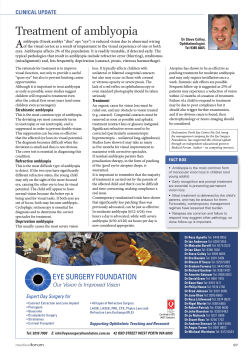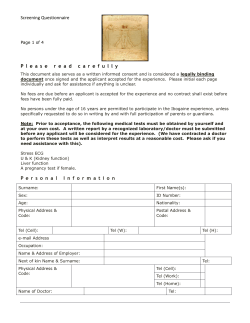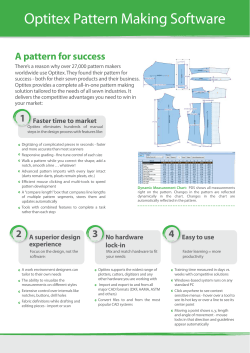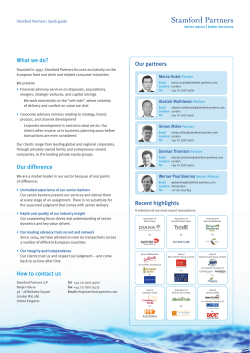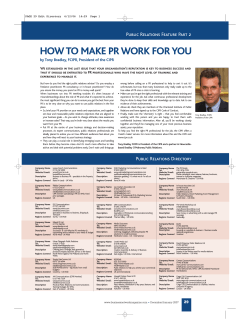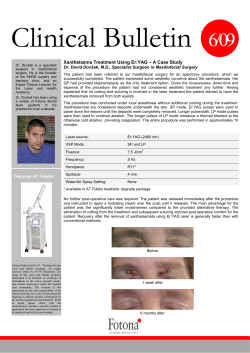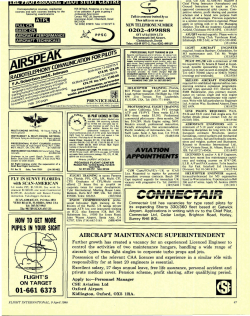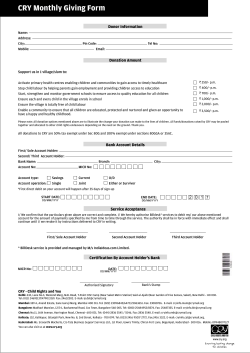
Laser Refractive Surgery: in a nutshell M
C L I N I C A L U P D A T E Laser Refractive Surgery: in a nutshell By Dr Ian Chan, Ophthalmologist. Tel 9388 1828 M isconceptions surrounding laser vision corrective surgery and other forms of refractive surgery are not uncommon. It is hoped this somewhat simplistic overview of LASIK (laser assisted insitu keratomileusis), the most common form of laser vision correction surgery, will assist the reader. The corneal surface is the main refractive apparatus of the eye and therefore a change in corneal shape can correct refractive error. These lasers sculpt the cornea by precisely removing tissue, like a lathe. How safe and successful is it? LASIK is 20 years old and over 18 million patients worldwide have had this treatment. A number of large series have been published. For example, the US Army offers laser correction for active soldiers to improve their combat effectiveness and in 2005, a series involving 32,068 eyes from this program was published (Ophthalmology 2005;112:184190); 85.6% achieved over 6/6 unaided vision following treatment; only 3 cases of infectious keratitis; and no patients had worse than 6/12 vision. A ten-year series from Singapore involving 37,932 laser treatments was recently published, with similar results. How is the treatment performed? LASIK involves cutting a circular corneal surface flap and laser treatment is applied under this flap to reshape the cornea. The average procedure takes 10-20 minutes per eye and the laser is active for only 1 to 2 minutes. Both eyes can be treated in the same session. What about reading glasses in a 50-year-old? Topical anaesthetic is used as the patient needs to actively look at a fixation light during treatment. Some parts of the procedure may be uncomfortable, however, most patients do not experience pain during treatment. In presbyopia the problem is the inability of the eye to change focus between distance and near, which is an ageing effect. LASIK can only correct the overall focus of the eye to one distance. It cannot restore the ability to change focus due to ageing. However, we can still help these patients using LASIK and other refractive surgery by utilising multifocal optics or monovision. What is the recovery period? What are the risks and side effects? What anaesthetic is required? Is it painful? Problems from LASIK are rare, as illustrated by series above. Major sight-threatening complications occur in less than 1 in 10,000; and dry eyes and glare at night are uncommonly recognised side effects. Patients typically recover in 1-2 days after LASIK. (Other forms of laser correction directly applied on the corneal surface can take up to 4 weeks to recover.) Who is suitable for the treatment? A detailed initial eye examination, which includes various computerised scans, determines the patient’s suitability based on the degree of refractive error, corneal thickness, ocular health and other factors. In short, LASIK can treat +5 to -10 diopters of spherical error and up to 6 diopters of astigmatism. This range covers most patients with reasonable thickness glasses. Eye Surgery Foundation Perth’s only freestanding Ophthalmic Day Hospital • Supporting ophthalmic research and development • Certified to ISO 9001 Standard Expert day surgery for • Cataract Extraction and Lens Implant • Pterygium • Glaucoma • Oculoplastic Surgery • Strabismus • Corneal Transplant • All types of Refractive Surgery – LASIK, LASEK, PRK, CTK, Phakic Lens and Refractive Lens Exchange (RLE) How much does it cost? Bilateral treatment costs around $6000 in WA. More than half of this sum is related to technology. For instance, the brand new, stateof-the-art laser at the Eye Surgery Foundation costs more than an average house. Medicare and most health funds do not cover these treament n Our Vision Is Improved Vision Dr Ross Agnello Tel: 9448 9955 Dr Ian Anderson Tel: 6380 1855 Dr Malcolm Burvill Tel: 9275 2522 Dr Ian Chan Tel: 9388 1828 Dr Steve Colley Tel: 9385 6665 Dr Dru Daniels Tel: 9381 3409 Dr Blasco D’Souza Tel: 9258 5999 Dr Graham Furness Tel: 9440 4033 Dr Richard Gardner Tel: 9382 9421 Dr Annette Gebauer Tel: 9386 9922 Dr David Greer Tel: 9481 1916 Dr Boon Ham Tel: 9474 1411 Dr Philip House Tel: 9316 2156 Dr Brad Johnson Tel: 9381 3409 Dr Jane Khan Tel: 9385 6665 Dr Ross Littlewood Tel: 9374 0620 Dr Nigel Morlet Tel: 9385 6665 Dr Robert Patrick Tel: 9300 9600 Dr Jo Richards Tel: 9321 5996 Dr Stuart Ross Tel: 9250 7702 Dr Andrew Stewart Tel: 9381 5955 Dr Michael Wertheim Tel: 9312 6033 Contact: Matthew Whitfield Ph: 9216 7900 Email: info@eyesurgeryfoundation.com.au 42 Ord Street West Perth WA 6005 medicalforum 45
© Copyright 2025

